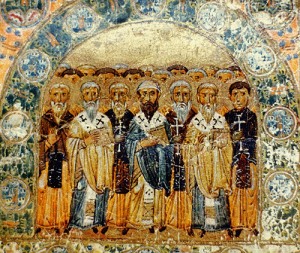 One man has died for all, and now in every church in the mystery of bread and wine he heals those for whom he is offered in sacrifice, giving life to those who believe and holiness to those who consecrate the offering.
One man has died for all, and now in every church in the mystery of bread and wine he heals those for whom he is offered in sacrifice, giving life to those who believe and holiness to those who consecrate the offering.
This is the flesh of the Lamb; this is his blood. The bread that came down from heaven declared: The bread that I will give is my flesh for the life of the world.
It is significant, too, that his blood should be given to us in the form of wine, for his own words in the gospel, I am the true vine, imply clearly enough that whenever wine is offered as a representation of Christ’s passion, it is offered as his blood.
This means that it was of Christ that the blessed patriarch Jacob prophesied when he said: He will wash his tunic in wine and his cloak in the blood of the grape. The tunic was our flesh, which Christ was to put on like a garment and which he was to wash in his own blood.
Creator and Lord of all things, whatever their nature, he brought forth bread from the earth and changed it into his own body. Not only had he the power to do this, but he had promised it; and, as he had changed water into wine, he also changed wine into his own blood.
It is the Lord’s passover, Scripture tells us, that is, the Lord’s passing. We are no longer to look upon the bread and wine as earthly substances. They have become heavenly, because Christ has passed into them and changed them into his body and blood.
What you receive is the body of him who is the heavenly bread, and the blood of him who is the sacred vine; for when he offered his disciples the consecrated bread and wine, he said: This is my body, this is my blood. We have put our trust in him. I urge you to have faith in him; truth can never deceive.
When Christ told the crowds that they must eat his flesh and drink his blood, they were horrified and began to murmur among themselves: This teaching is too hard; who can be expected to listen to it?
As I have already told you, thoughts such as these must be banished. The Lord himself used heavenly fire to drive them away by going on to declare: It is the spirit that gives life; the flesh is of no avail. The words that I have spoken to you are spirit and life.
Gaudentius of Brescia (d. 410): Sermon 2, from the Office of Readings, Thursday in the fifth week of Easter @ Universalis.









